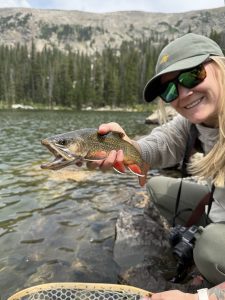A big opera, a rock concerto, and a glistening violin debut

Diego Redel/Courtesy photo
In a season with some of the best opera offerings in recent years, the Aspen Music Festival topped things off Tuesday with the “arena” version of Puccini’s evergreen “La bohème.” The 2,000-seat Klein Music Tent often distorted the balance between the orchestra and a strong cast, led by one of the world’s best lyric tenors.
Tenor Matthew Polenzani and a team of accomplished young singers too often were forced to belt to be heard over an orchestra sharing the stage with them. Quieter moments came through best, as did a stage full of chorus and extras in an exuberant Act II.
They managed to play out the drama with realism and panache in the semi-staged concert-style presentation. Credit director Katherine M. Carter with finding deft ways to enhance their acting.
The Aspen Chamber Orchestra, under the Lyric Opera of Chicago’s music director Enrique Mazzola, caught the Puccini musical dialect with appropriate inflections and perfect tempo adjustments, even if the singer had to double-down on high notes. In the Act I duet between Polenzani (as Rodolfo) and soprano Kayla Raw Stein (singing Mimì), it was almost as if Mazzola forgot that the orchestra was right behind the singers rather than deep in an orchestra pit and the sets could project the voices.
On the other hand, the robust sound was just what the doctor ordered for the heart-tugging scene of Mimì’s death at the end. Those orchestral thrusts injected the drama impressively.
It should be noted that there was no apparent amplification for the voices — a welcome choice when luxuriously refined orchestral textures brought out the more intimate moments. Fortunately, subtle adjustments in volume in Acts III and IV made things better. Especially good were Rodolfo’s Act IV duet with Marcello (baritone Yichen Xue), in which they comfort each other on the loss of their girlfriends, and the entire Act III sequence when Rodolfo and Mimì decide to part but remain together until spring.

Act II, filled with an oversized chorus, a children’s chorus, and a host of uncredited Paris citizens, took full advantage of the big performance space. Getting it all to mesh set up a delightfully outrageous “Quando m’en vo” aria from soprano Virginia Mims. Her feistiness contrasted perfectly with Stein’s shyness.
Baritone Jason Edelstein, as the flamboyant musician Schaunard, and bass-baritone Peter Barber, as the droll philosopher Colline, completed the Bohemian group nicely. As the landlord Benoît and Musetta’s rich admirer (and foil) Alcindoro, Abraham Isai Cruz-Ramirez hit all the right notes as older fuddy-duddies.
On Wednesday evening in Harris Hall, longtime Aspen favorite Robert McDuffie added to the season-long sub-theme of offbeat recitals. The “Concerto for Violin, Rock Band, and Strings” by Mike Mills reprised an Aspen debut performance in August 2016, when it was done with a full orchestra.
The bass guitar player of the alt-rock ensemble R.E.M. wrote the piece for McDuffie. They have been friends since high school in Macon, Georgia. McDuffie has the Southern flair to make the most of an amalgam of country fiddling, rock rhythms, and classical virtuosity in the solo part.
A string quintet balanced well against amplified guitars and solo violin, none of it too loud nor too tame, with no percussion but plenty of vitality in this series of six movements with song titles. The one that made the biggest impression was “Stardancers’ Waltz,” which began with the bass guitar bouncing up and down octaves in rhythm. As it expanded upon a catchy tune, the music found its way around all the instruments delightfully.
In another plus, Mills on piano and McDuffie on violin rendered “Nightswimming,” a mid-1990s R.E.M. recording, as an intimate duet. (If Mahler can insert his songs into symphonies, why not Mills?) “Sonny Side Up” and the finale, “You Can Go Again,” raised the ante on with harder-core rhythms to the excitement of a good-sized audience of both gray-hairs and younger.
For contrast, Brahms’ gentle “Violin Sonata No. 1” opened the show as gently as the concerto amped it up. The encore got their fans singing along with “Losing My Religion,” R.E.M.’s biggest 1990s hit.
On Thursday, Aubree Oliverson, who made a name for herself as a youngster here in past years, returned for a center-stage recital of her own. A program ranged from Handel and Bach to Stravinsky and Messiaen demonstrated how she has developed into a musician to be reckoned with. Still in her 20s, she displayed silvery tone, technical savvy, and a musical wisdom that sets her apart from her peers.
She attacked Bach’s “Chaconne in D minor” with aplomb. Each four-measure turn emerged naturally and inevitably, yet still felt fresh. Kreisler’s “Praeludium” and “Allegro” had stature and flair, and the showpiece “Rondo Capriccioso” by Saint-Saëns was a tour-de-force, deftly backed by a quintet of current students.
John Williams’ arrangement of Gardel’s tango “Por una cabeza” could have used more sinuousness, but her take on Stravinsky’s Divertimento (a violin-and-piano version of the ballet “The Fairy’s Kiss”) was spellbinding as she savored the rhythms. The encore reflected the sincerity and beauty of a violin-and-piano arrangement of Florence Price’s “Adoration.”
Monday’s debut by pianist Scott Dunn was less scintillating. He had arranged some of his favorite movie music of the 1940s and 1950s (what he terms “the golden era” of film scores) for solo piano, including music by Bernard Herrmann, Elmer Bernstein, Alex North, David Raksin, and Leonard Rosenman.
The clear standouts were Aaron Copland’s own piano reductions of excerpts from “Our Town” and Raksin’s original “A Song After Sundown” (from the noir film “Too Late Blues”). Dunn’s piano arrangements of Herrmann’s extraordinary title music for “Psycho” or the jazzy flavor of North’s work on “A Streetcar Named Desire” might have brought revelations. I missed their familiar instrumentations and visuals, suggesting that more enhancement (as Liszt did for his adaptations of opera music for piano) might have helped. Dunn’s arrangements of Raksin’s theme from “Laura” and three short scenes by Elmer Bernstein from “To Kill a Mockingbird” made for more evocative listening.
Harvey Steiman has been writing about the Aspen Music Festival for more than 30 years. His last review of the season will appear in The Aspen Times on Tuesday.









